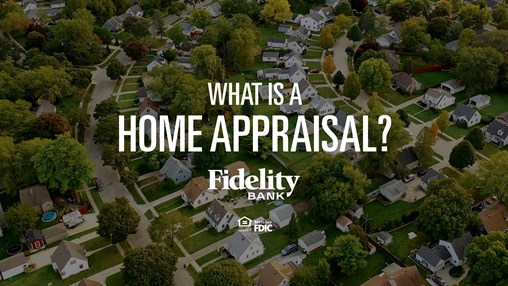Mortgage Lending FAQ
Mortgage lending FAQ
12/5/2019Buying a home is one of the most important decisions you will make, and with so many mortgage options and unfamiliar terms and processes, it can seem rather complicated. But, at Fidelity Bank, we are committed to providing you with a hassle-free home loan from application to closing. We have compiled a list of frequently asked questions for mortgages to ensure you are informed every step until you are home.
LOAN OPTIONS
Q: Why types of loans do you offer?
A: We offer the following home loan options: conventional fixed-rate loans, adjustable rate mortgages, Federal Housing Administration (FHA) loans, Veterans Administration (VA) loans, construction loans, physician loans, land loans, USDA/rural development loans, warrantable condo loans, jumbo loans, investment property loans and refinance loans.
Q: How do I get a loan to build a new home?
A: With comprehensive experience in new home construction lending, we will remove the frustration from the home building process. Our mortgage lending team stands ready to answer questions and provide lending options to best suit your building needs.
Find a loan officer Learn More
Q: What is a prequalification, and why is it recommended before finding a home?
A: A mortgage prequalification is a financial review process to ensure you meet basic criteria to qualify for a mortgage. This will quickly give you information on the type and amount of mortgage you can afford. Once you have a prequalification, you can confidently begin the house hunting process. Start your prequalification process online.
Q: What is a VA loan, and who is eligible?
A: Veterans Administration (VA) loans are available to United States veterans and service members and are guaranteed by the Federal Government for the purpose of providing access to home ownership to the brave men and women of the military.
Q: What is an FHA loan, and who is eligible?
A: FHA loans are insured by the Federal Housing Administration (FHA), allowing for low down payments, low closing costs and easy credit qualification. Buyers must meet certain criteria to qualify, including steady income and proof of employment, and the home must be the borrower’s primary residence. Speak to a mortgage professional to determine if you qualify.
Q: What is the difference between fixed rate loans and adjustable rate mortgages?
A: The interest rate of a fixed rate loan will not change over the life of the loan. For an adjustable rate mortgage (ARM), an initial interest rate is determined at the approval of the loan, but the rate may go up or down over the life of the loan as federal rates change. Speak to a mortgage professional to determine which mortgage is best for your financial situation.
Q: Which mortgage is better for me?
A: Each individual’s financial situation is different, so there is no one-size-fits-all mortgage option. A mortgage professional can review your prequalification to prepare a customized recommendation for you, or you can use our calculator to compare the total cost of any two or three mortgages.
APPLYING FOR A MORTGAGE
Q: Do I have to pay a fee to become prequalified?
A: No, there is no fee to prequalify for a mortgage, but an application fee is required once a full application is submitted and Fidelity Bank is given consent to continue the loan process.
Q: What documents will I need to apply for a loan?
A: Here is a printable list of the items you may be asked to provide during the home loan process.
Q: How do I apply for a home loan?
A: You can begin the home loan process by selecting the mortgage loan officer you wish to handle your application. If you’re not already working with one of our lenders, you may go directly to the prequalification form to apply online, and a mortgage lender will connect with you to complete the process.
Find a loan officer Apply online
Q: Can I get a home loan if I am self-employed?
A: Yes, you can be approved for a mortgage if you are self-employed. Your mortgage professional will walk you through the process and identify any additional documentation that will be required to complete your loan application.
FIND A LOAN OFFICER APPLY ONLINE
Q: Can I get a loan if I have negative history on my credit report?
A: Yes, it may be possible to qualify for a mortgage if you have negative credit history or a low credit score. Please speak to a mortgage professional, and we will help determine what loan options are available for your exact financial situation.
Q: What is debt-to-income ratio?
A: Debt-to-income ratio is calculated by all of your monthly debt payments divided by your gross income (the money you earn before taxes and deductions). This ratio is used to determine a borrower’s ability to repay debt.
Q: Can I open new credit accounts after prequalifying for a home loan?
A: No, you should refrain from making any credit changes immediately before or after prequalifying for a home loan, such as applying for a new credit account, closing a credit account, increasing a credit limit or utilizing a large amount of available credit. Doing so could negatively impact your credit score, which could affect your interest rate or prevent you from qualifying for a mortgage.
Q: How much mortgage might I qualify for?
A: Most lenders base their home loan qualification on both your total monthly gross income and your monthly expenses. Our home financing calculator can help you estimate how much home you can afford.
LOAN COSTS AND FEES
Q: How much home can I afford?
A: This calculator computes the most expensive house you can buy based on the highest payment you can afford, but does not indicate whether you would qualify for the loan.
Q: How much will my loan payment be?
A: Use our helpful calculators to estimate your home loan payment amounts.
This calculator computes the payments (principal and interest) for a fixed rate loan.
This calculator computes the estimated payments and interest for an adjustable rate loan, where the rate increases by the maximum amount allowed at each interval until it reaches the rate cap.
Q: How are mortgage rates determined?
A: Mortgage interest rates are determined by federal rates combined with several factors for your personal financial situation, including your credit score, down payment amount, loan terms, rate type (fixed or adjustable) and loan type (conventional, FHA, USDA, VA).
Q: What is a mortgage interest rate lock?
A: If you qualify for a mortgage with Fidelity Bank, you can request a rate lock on your loan. This is an agreement between the lender and the borrower of a mutually agreed upon rate that will not change, regardless of market changes, between the date the parties lock the rate and the closing date. This allows you to lock in the mortgage interest rate while you search for your dream home.
Q: Can I lock in my interest rate before I buy a home?
A: Yes, if you qualify for a mortgage with Fidelity Bank, you can request a rate lock on your loan.
Q: Can I lock in my interest rate while I’m building a new home?
A: Yes, with our Extended Rate Lock program, you can request an interest rate lock while your home is under construction.
Q: What is the difference between APR and interest rate?
A: The interest rate is the cost of borrowing the principal loan amount and determines your monthly payment amount. APR stands for Annual Percentage Rate, which is the cost of the loan to the borrower. The APR includes interest expenses plus costs such as loan origination fees, mortgage insurance, discount points and closing costs. The APR is a better determination of what you are really paying for your mortgage and can be compared across lenders to determine the best rate.
Q: Do I have to pay 20% for my down payment?
A: No, you do not need a 20% down payment. We offer loan programs that do not require any down payment with certain requirements met. Additionally, our conventional loans can require as little as 3% down and FHA loans require as little as 3.5% down payment. The down payment requirement varies depending on the loan program and your personal financial situation.
Use our loan calculators to evaluate the impact of a down payment, and speak to a mortgage lending professional to learn more about our zero down payment and low down payment options.
Find a loan officer Learn more
Q: Can I get down payment assistance?
A: There are several down payment assistance programs and grants available depending on your personal circumstances. Please speak to your mortgage lending professional for information specific to your situation.
Q: Can I get a loan without a down payment?
A: Yes, there are mortgage programs that can help you finance your home without a down payment, such as our Equity Builder Home Loan.
Q: What is escrow?
A: An escrow account is money held in reserve, and it is used before and after you purchase your home.
When you are in the process of purchasing a home, the earnest money you pay after your offer has been accepted is deposited into a short-term escrow account to show the seller that you are serious about purchasing the home. Once you close on your home, the earnest money is released back to the buyer, and it can be applied to your down payment or mortgage closing costs.
After you purchase your home, your lender will open an escrow account that remains active for the life of your loan. A portion of your monthly mortgage payment is deposited into this account and held in reserve for your lender to pay property taxes and homeowners insurance payments for your home.
MORTGAGE PROCESS
Q: What inspections or appraisals are required to buy a home?
A: An appraisal is required to determine the value of the home, and additional inspections may be required, depending on the home and loan type.
Q: What do I need to bring to closing?
A: The closing is the scheduled meeting to pay all remaining fees and sign paperwork for your mortgage. For this meeting, you will need to bring the following items: a cashier’s check or wire transfer record for the amount of money needed to close (including your down payment and closing costs), your closing disclosure, all borrowers and co-signers, valid identification, and a checkbook in case of additional funds required.
Q: How long does it take to prequalify for a home loan?
A: Our hassle-free application process is rapid thanks to our in-house team of lenders, underwriters and processors. If we receive all of your necessary information, we will be able to provide an answer on your prequalification within 1-2 business days.
Q: How long does it take to close on a home loan?
A: Most mortgage loans can close within 30 days, but some loan programs can take up to 45 days to close, such as those which include down payment assistance. However, in order to close on your home loan, all necessary documentation must be submitted and terms of the purchase contract must be met, including inspections, earnest money, appraisal and repairs.
Q: What is mortgage insurance?
A: Private mortgage insurance (PMI) is a type of insurance lenders may require if the buyer puts down less than 20 percent of the home’s purchase price. PMI protects lenders if the homeowner defaults on the loan.
Q: What is title insurance?
A: Title insurance protects homebuyers and mortgage lenders against problems with the title when there is a transfer of property ownership. With the purchase of insurance, a title company researches records to identify and correct any possible ownership issues.
Q: How do I make a mortgage payment?
A: After closing, Fidelity Bank will provide you with instructions on making your mortgage payments. Options include mailing payments, setting up free automatic payments from your checking or savings account and utilizing Speedpay services for one-time online payments.
Q: Can I make bi-weekly payments?
A: Yes, you can set up bi-weekly payments for your mortgage. Please contact our mortgage loan servicing department at 1.800.304.6161 for assistance with this process.
Q: Where can I find my mortgage account online?
A: For online account access, visit fidelitybank.com and select Online Account Login from the top navigation, select Mortgages and then select My Mortgage Account from the menu. This will route you to the mortgage login page.
For additional mortgage information, visit our Home Loans page or scroll through our News and Advice articles to learn more about the mortgage options we offer. You may also speak to a mortgage loan professional by locating an officer near you or calling us at 844.277.2163.
With our extensive home loan options and comprehensive mortgage lending knowledge, you’ll be home in no time.


